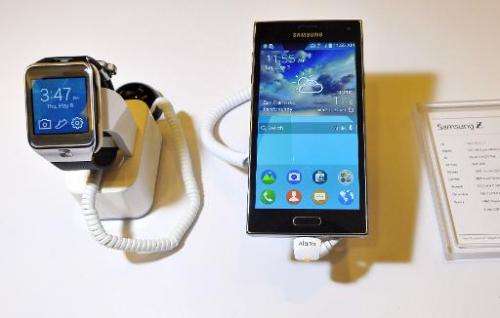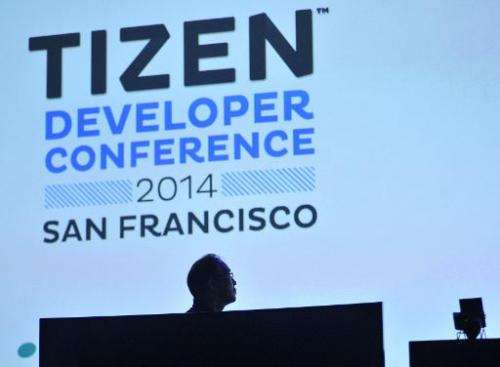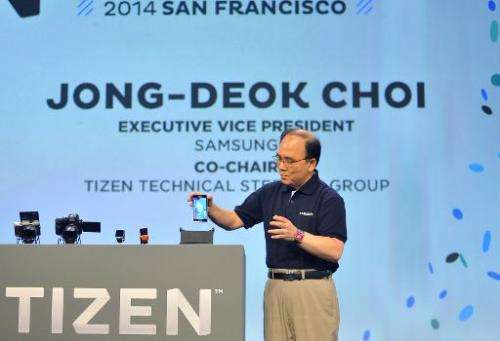Samsung sees Tizen phone as gateway for bigger things

Samsung on Tuesday unwrapped its new smartphone using the Tizen platform, a move aimed at breaking away from Google's Android and staking a claim to the "Internet of Things."
The South Korean consumer electronics colossus showed off the Samsung Z, its first Tizen-powered smartphone, in a major shift away from the ubiquitous Android operating system used in the majority of its devices.
Samsung touted Tizen as a platform not just for phones, but for a range of connected devices from home appliances to door locks and watches which may communicate with one another in the future.
The unveiling came a day after Apple—a few blocks away in San Francisco—unveiled a coming new version of its iOS mobile operating system with capabilities that could have iPhones, iPads, and iPod touch devices vying for that same spot in the middle of a what is billed as the booming Internet-of-Things.
The world's biggest smartphone maker made its pitch at the Tizen Developer Conference, a forum that aims to help the platform become a rival to Android and Apple's iOS.
Samsung showed off a line of Tizen-powered devices ranging from Tizen-Android cameras to its freshly announced smartphone powered entirely by the South Korean technology firm's open-source operating system.
Samsung even teased a prototype smart television that connects to rich online content using Tizen.
Cash prizes for apps
Along with being enticed with contests offering cash prizes for winning applications, the approximately 1,000 developers at the keynote presentation were urged to check out an Open Smart Home project for "monitoring and controlling devices in the home or on the body all together" whether from one's living room or from half a world away.

"The goal of this project is to have it evolve into services for the entire Internet-of-Things," Samsung executive vice president and Tizen technical steering committee co-chair Jong-Deok Choi said during an on-stage presentation.
"We plan to have this project implemented through Tizen."
Samsung announced Monday the launch of a new smartphone based on its own operating system, in a step towards independence from the Google Android platform that dominates its popular handsets.
The Samsung Z, which has been specially developed to run on the Tizen platform, will go on sale in Russia in the third quarter of this year before reaching other markets.
The vast majority of Samsung's devices, including its flagship Galaxy S smartphones, use the Android operating system.
Exploding 'IoT'
International Data Corporation (IDC) on Tuesday forecast that the global Internet-of-Things market will grow from $1.9 trillion last year to $7.1 trillion in the year 2020.
People are embracing the "IoT" in their homes, vehicles and elsewhere, while businesses are being lured by promises of efficiency and revenue, according to IDC.

"The worldwide IoT market is exploding," said IDC mobile services vice president Carrie MacGillivray.
California-based Google has long pitched the potential for its free Android operating to be used to power broad arrays of devices in homes in a vision that goes far beyond smartphones and tablet computers.
Developer Henry Yu of Silicon Valley-based RGB, which specializes in streamlining video formats, was among those at the Tizen conference and suspected that no single platform would rule the IoT.
"At the end of the day, they will have to work together," Yu said of rivals such as Samsung, Apple and Google vying to be at the center of the IoT.
"The Internet-of-Things has been around, but it is hodgepodge. People will want to get along because they want each other's market."
© 2014 AFP





















